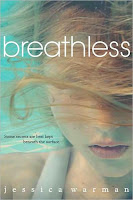 Lost
LostJacqueline Davies
2009; Marshall Cavendish; ISBN 978-0-7614-5535-6 (hardcover)
Summary: Looking up from her sewing machine in the waist factory, Essie sees Harriett and knows immediately she's lost. A rich girl working in a factory? There's a story there, and Essie can't help wondering at the details. Yet as Essie learns about Harriett, she starts to learn about herself, too. Is she just Essie Rosenfeld, who lives on Orchard Street and worries over her siblings and argues with her mother? Or could Essie be lost, too?
Three Things to Know About Lost
#1: Facts can be the jumping-off point for fiction.
Jacqueline Davies draws upon two real-life events to create this work of fiction: the disappearance of socialite Dorothy Arnold and the fire at the Triangle Shirtwaist Factory. These two divergent storylines are skillfully woven together, proving that if you don't have all the facts, just a few pieces of information is enough to create a story. This is a lesson that we all know, but we are reminded of its power when we read a well-crafted historical fiction. But the story isn't constrained by the facts, either. No one knows what happened to Dorothy Arnold--why not picture her working at a factory? And just what would that mean both to Dorothy and to a girl who became her friend? Those are the questions answered in Lost.
#2: You can hide in different ways.
Essie and Harriett are both trying to push away their pasts. While Harriett is running from the boredom of her prison-like existence as Dorothy Arnold, Essie has run from reality. Her mind has blocked the fact that her little sister is dead. Essie lavished affection on Zelda, kissing her hurts and indulging her every whim. She saw her mother as cruel for trying to restrain Zelda. But Essie doesn't realize-until it's much too late-that her mother's rules for Zelda were about love and protection. Essie doesn't learn this until after she is recovering after the Triangle fire. Lost in her mind, drugged to minimize the pain of her injuries, Essie is able to make peace with Zelda within her own mind, and thus find herself. Harriett is not so lucky. A victim of the fire, she is cheated of the possibilities that she might have had: to become a better writer, to be a good mother. Yet Harriett has still made peace with herself and with her choices, and is no longer lost.
#3: Place is tied to personality.
Essie is a product of where she grew up. In the crowded Lower East Side, everyone knows everyone's business. And what's more, the street you live on is part of your identity, for yourself and for those you meet. It's not just about class: it's about establishing your place in the universe. This extends beyond Essie's world; Dorothy/Harriett is a reflection of where she lived. However, she had lived in upper-class surroundings, one of spacious homes and visits to all the fashionable watering-holes. But all these advantages felt like bars to her, keeping her away from freedom. Harriett finds room to breathe within the cramped confines of lower Manhattan, in Mott and Delancey and Houston streets. Yet she's still cultured, refined Dorothy. While you can take the girl out of the drawing room, you can't take the drawing room out of the girl. That's what makes Essie curious about Harriett when she arrives at the Triangle factory.
A haunting exploration of a time and place, Davies brings 1911 New York to life, down to its sounds and smells. What's more, the characters are just as vivid as the setting. Street-smart and wounded Essie and romantic and kind Harriett: these two characters propel the story forward. Even the most minor of supporting characters, such as Essie's neighbors and the girls in the factory, are well-drawn. Utilizing a plot studded with flashbacks, Lost is a complex look at how we can recover from grief and become stronger. One of the best books I've read in 2009, pass this along to any reader looking for how to overcome the disasters we face in life.














